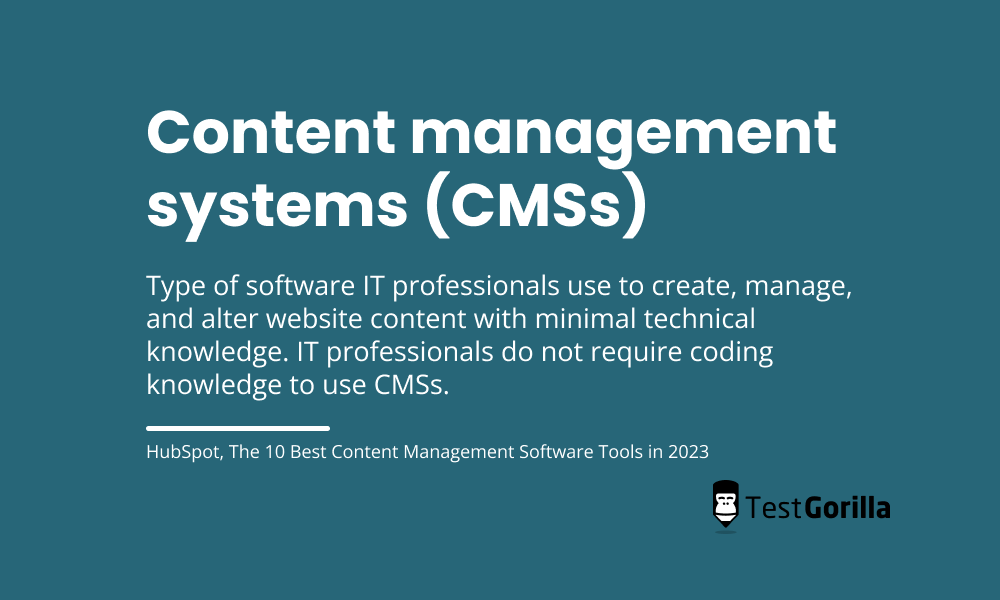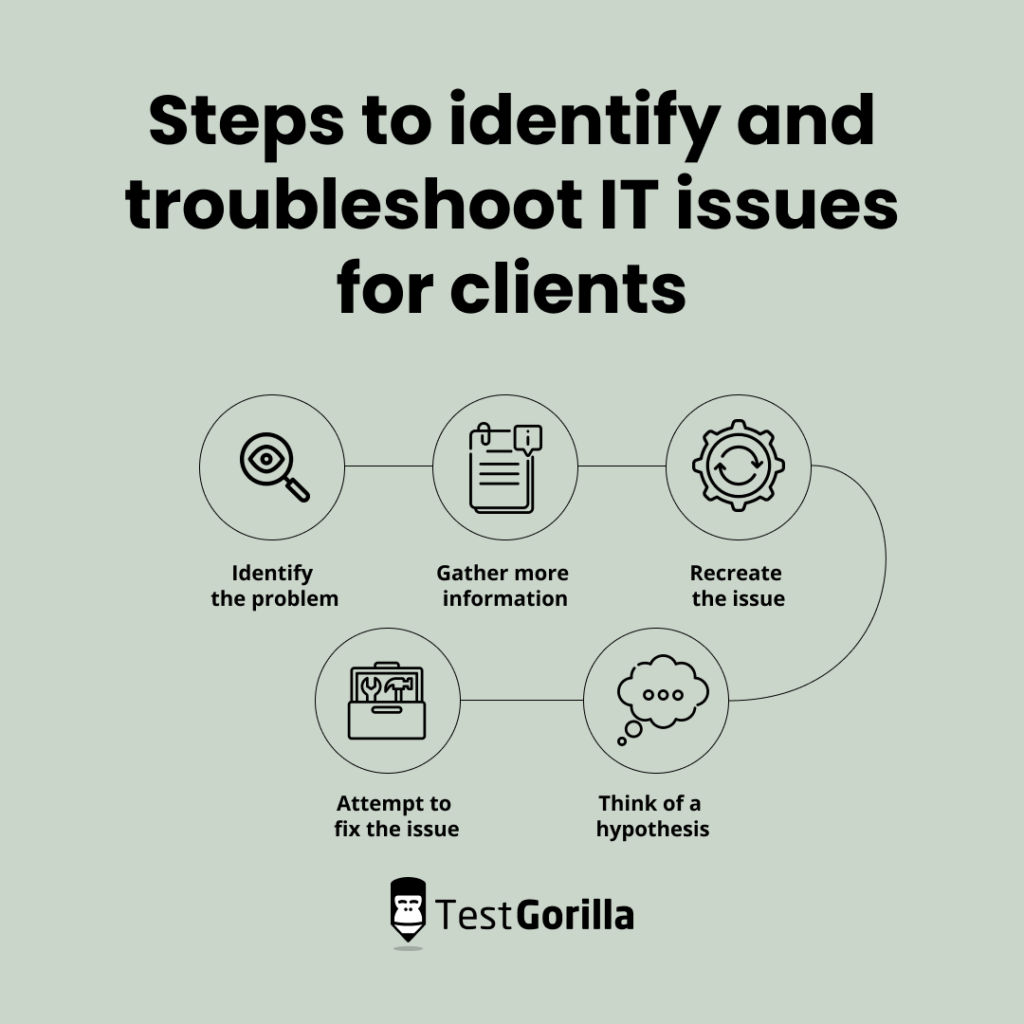25 IT technical interview questions to ask experts
Skills-based hiring in tech
Tech employers are seeing better results than the industry-wide average. Read the Talent over Titles in Tech report to learn more.
Does your company need an IT technical professional with suitable skills? If you initially planned to screen your applicants’ resumes and realized that the process might be too time-consuming, some easier alternatives are available.
For a trouble-free hiring process, you can begin creating a skills assessment that includes a Computer Literacy (PC) or IT Business Analyst test. After candidates complete skills testing, you can start the interview process.
Not sure where to get the right IT technical interview questions? There’s no need to worry. Read on to discover 25 suitable questions that will help you evaluate your candidates’ proficiency.
25 IT technical interview questions to test skills and experience
Choose from these 25 IT technical interview questions to learn if your candidates’ expertise matches your company’s requirements.
1. Can you provide a list of the programming languages you know well?
IT technical professionals should understand a few programming languages that help them complete tasks like website editing projects and data organization.
Candidates might mention a few programming languages, but remember that each applicant may provide a unique answer. Here are a few of the most popular programming languages that they may mention:
Java
SQL
JavaScript
Python
C++
Since these programming languages are vital for IT professionals, consider assessing your candidates’ ability to use them with our programming skills tests.
2. Could you explain some limitations of your favorite programming language?
Although candidates might have their favorite language and understand how to use it, the real test is whether they can explain how the programming language is limited.
For example, suppose your applicant prefers Python. They should know that this language is relatively slow and doesn’t support mobile environments or provide database access.
3. Do you know any scripting languages? Tell us which projects you used them for.
Scripting languages are among the most popular coding languages for IT technical professionals. Your applicants should understand that they make it easier and faster to complete coding tasks and mention a few examples of projects they have used them for.
Below are a few of the most popular scripting languages:
PHP
Ruby
VBA
Bash
If you need a data-driven method to review your applicants’ scripting language skills, you can use our PHP, Ruby, Visual Basic for Applications, or Bash skills tests.
4. Are you familiar with any design software? Which applications do you prefer?
IT technical professionals need design software knowledge and experience to design, create, edit, and view different types of graphics. Your applicants should understand why design software is essential and be able to name a few projects they completed using these tools.
The following are some examples of the popular design software tools your applicants might mention when responding to this question:
Figma
Solid Edge
InDesign
Canva
Photoshop
Candidates should also know that these tools help IT technical professionals create websites, build prototypes, and make wireframes. Consider our Figma, Adobe InDesign, or Adobe Photoshop skills tests to test their expertise with these tools.
5. Would you be willing to complete training courses to enhance your IT skills?
Since not every IT professional who applies for your vacancy will be proficient in all aspects of the field, applicants should be willing to complete company training courses to improve. Candidates may mention a few skills they need to hone and show they’re eager to grow.
For example, if an applicant lacks knowledge of the Java framework, they might mention that they are interested in completing a Java training course.
Be wary of applicants who do not want to take advantage of training opportunities – this lack of enthusiasm might suggest they are not committed to continuous improvement.
6. Why is UX framework knowledge important for IT professionals?
Candidates who understand what user experience (UX) frameworks do will know they help IT professionals streamline design and development and create consistent and high-quality user experiences. Applicants might also mention the benefits of using UX frameworks, such as:
Improving the company’s brand reputation
Enhancing customer loyalty
Increasing user engagement
7. Which methods do you use to deploy a product?
A few critical methods can help applicants quickly and efficiently deploy an IT product. Here is a list of steps for completing this process:
Prepare and plan the process
Notify the stakeholders and collaborators
Complete the testing phase
Deploy to production
Track the logs and investigate errors
To show their knowledge, they might also mention a few examples of software development strategies, such as basic, rolling, multi-service, canary, and A/B testing deployment.
8. Do you have a favorite UX framework? Explain why you prefer to use this one.
Many UX frameworks make it easier for IT professionals to create product designs. Applicants with experience using many of these tools should explain which is their favorite and why. Each response will vary, but some of the best examples include the following:
Bootstrap
Ionic
jQuery
Check if your applicants have used some of these frameworks in their roles by asking follow-up IT technical interview questions like “What results did you achieve when using your favorite UX framework?”
9. Do you have a method for learning an end user’s requirements?
End users use products that IT teams develop and have specific requirements that a company’s product should meet. A few methods can help IT professionals understand the end user’s requirements. They should:
Get the end user’s input with surveys and interviews
Complete usability testing to learn how end users interact with the product
Create a user persona – a fictional character who represents the intended user
10. Could you tell me the largest dataset you’ve worked with?
From financial to healthcare data, many types of large datasets exist. IT professionals should have experience working with significant datasets if their role requires knowledge of big data. By asking your applicants for examples of how they manipulate large datasets using IT skills, you can learn if they are suitable for your team.
Use our Data Science skills test to assess your applicants’ data-related knowledge in more detail.
11. Which content management systems have you used?
Content management systems (CMSs) are a type of software IT professionals use to create, manage, and alter website content with minimal technical knowledge. IT professionals do not require coding knowledge to use CMSs.
Candidates familiar with content management systems may name some instances of this software and discuss their advantages. Here are a few examples:
WordPress
Joomla
Wix
Squarespace
12. What do you understand about the Agile methodology?
Applicants should understand that Agile is a framework for project management. If they have worked with this project management model, they should know that it divides projects into many phases or sprints.
Since the Agile framework helps teams complete IT projects on time, candidates should use it for their projects. Check if your candidates understand the advantages of the Agile framework to test their knowledge.
A few benefits they may mention include:
Increased control over projects
Enhanced project quality
Reduced risk and fewer obstacles
13. Do you have a method to prioritize two competing project deadlines?
Meeting deadlines is crucial for IT projects. Fortunately, IT professionals can use several methods to prioritize and manage their work.
They should know not only the main causes of delays to IT projects, such as poor project planning, but also a few strategies to avoid them. Listen out for responses that mention methods like the following:
Set realistic goals
Clarify the main project targets
Hold team meetings
Use the correct resources
Track the progress of the project
Since time management is essential for helping applicants manage competing project deadlines, make sure you give them a Time Management skills test as part of their candidate assessment.
14, Could you tell us if you have any tools that facilitate your remote work?
Many IT professionals complete their duties remotely and have plenty of tools to manage their work. Interviewees should mention a few tools and a couple of their advantages when responding to this question.
From project management tools like Asana to communication software like Slack, software can support project completion. Ask your candidates follow-up IT technical interview questions about how they use these tools to learn about their work styles. For example, some applicants might use Slack to communicate asynchronously.
15. What do you know about technical support engineer roles?
If you’re hiring an IT professional who will complete support engineer duties, check whether they have experience in this field and understand what technical support engineers do. Applicants should know that support engineers provide tech support services and help clients troubleshoot issues in many industries.
16. Explain to us what you know about the latest processors.
Your interviewees, including junior-level applicants, should understand what processors are. Knowledgeable applicants are aware of the latest processors. Candidates should mention a few of the best modern processors, such as the Intel Core i9-13900K or AMD Ryzen 5 7600X.
They might also discuss the advantages of a powerful, updated processor and explain that they can help a computer complete tasks quickly.
17. Do you have a technique for troubleshooting issues?
Experts in information technology should understand how to troubleshoot IT issues for clients. They might follow a few steps to ensure they understand the cause of the problem and find a way to solve it. Below is an example of a troubleshooting process your candidates may use:
Identify the problem
Gather more information about the problem
Recreate the issue
Think of a hypothesis for the cause
Attempt to fix the issue
You can also ask follow-up IT technical interview questions such as “How have these methods helped you successfully solve problems for clients?” to determine if these methods are effective.
If you require additional information about your candidates’ problem-solving skills, integrate our Problem Solving skills test into your hiring process.
18. Can you tell me why you enjoy technical support projects?
Ask candidates this IT technical interview question to test their passion for completing technical support projects.
Some applicants may enjoy solving technical problems for clients. Other interviewees might find technology fascinating and enjoy working with people. Whichever factors motivate your candidates, listen for responses that convey enthusiasm and interest in the field.
19. Do you understand how SDKs and APIs are different?
An SDK is a software development kit, and an API is an application programming interface. Interviewees should know that SDKs provide IT professionals with tools, libraries, documents, and code samples to create software applications.
They should also understand that APIs act as a set of rules that enable applications to communicate with each other. IT professionals can use APIs to access and use another system’s functionalities or data without needing to know the details of its implementation.
Applicants may also compare a few other features of SDKs and APIs, such as that SDKs can contain APIs and that APIs are fundamental to integrating different systems in software development.
20. What would you do if you couldn’t access a file on a shared drive?
Many methods can help IT professionals rectify an inaccessible file on a shared drive. Candidates with sufficient experience should know how to solve this problem. For example, they might:
Check whether the system responsible for sharing the drive is on
Consider if the client has permission to access the file
Ensure the programs are compatible with the file
Make sure someone else is not using the file
If you need more information about your candidates’ skills and knowledge related to inaccessible files, don’t be afraid to ask them more about their experience with file sharing.
21. Can you tell me the advantages and disadvantages of using imaging software?
Interviewees might first define what imaging software is when responding to this IT technical interview question. They may mention that this graphic design tool enables IT professionals to create and manipulate images and discuss the software’s pros and cons.
A few advantages of imaging software include the following:
It offers advanced image-editing and design features
It supports non-destructive editing by preserving the original image
It is compatible with many different file formats
Imaging software also has some disadvantages:
The tools can be expensive
They cannot easily recover from errors
22. Do you understand what disk partitioning means? Explain this concept to us.
A disk partition is a storage space on a hard drive used to store applications and data. User data is typically stored on a separate partition – and one disk can have as many as four primary partitions.
Applicants may also explain that a disk can have an extended partition that can hold multiple logical partitions.
23. What do you understand about cache memory? Can you name some of its advantages?
Cache memory is a high-speed memory component that ensures users can efficiently retrieve frequently accessed data from the computer’s memory. It acts as a temporary storage space, usually in a chip form, and enables professionals to access memory more quickly than if they used the computer’s main hard drive.
24. Do you understand how a motherboard and a chipset are different?
A motherboard is the biggest circuit board in a computer that serves as a hub for a computer’s components, such as the CPU, RAM, storage devices, and peripheral devices.
A chipset component integrates into the motherboard and manages the data flow from the processor to the memory and the peripherals. Candidates should know that chipset timing affects the system’s performance.
25. How do you improve from your errors as an IT professional?
No IT professional is perfect, and it’s normal for them to make some errors in their role. The best way to assess responses to this question is to consider if your candidates learned from their mistakes. For example, if applicants incorrectly troubleshoot an issue, listen for answers explaining how they corrected their troubleshooting methods.
Some might pay more attention to their problem-solving methods, whereas others may consult their team for support when solving the issue.
See more technical interview questions in 24 technical interview questions and answers to look out for.
When in the hiring process should you use IT technical interview questions?
At TestGorilla, we suggest asking IT technical interview questions after you create an IT technical assessment for candidates and receive their test results. What makes this an effective hiring method is that you can instantly spot promising candidates by checking the percentages and candidate star ratings in their results.
Creating a shortlist for the interview process couldn’t be easier with this method. It also helps you avoid unconscious bias since you select the best candidates based on their proven knowledge.
Since skills assessments test several IT technical skills, you can use what you learn about candidates from the tests to create follow-up questions for the interview. Use skills assessments first, and then ask your professionals some of the IT technical interview questions we have provided.
The best insights on HR and recruitment, delivered to your inbox.
Biweekly updates. No spam. Unsubscribe any time.
Hire an IT professional with IT technical interview questions and skills assessments
The simplest way to hire a skilled applicant for your team is to use IT technical interview questions and skills assessments that feature a Computer Literacy (PC) or IT Business Analyst test. Skills assessments are the data-driven tool you need to focus on applicants with the knowledge to join your organization.
Are you unsure which skills-testing platform you should choose?
TestGorilla is the ultimate option for companies that want to replace resume screening and quickly hire top applicants for their company. More than 8,900 businesses have selected TestGorilla. If you want to find out why our platform is the best option for hiring top candidates, check out TestGorilla’s features.
Sign up for TestGorilla for free today, and start using skills testing and IT technical interview questions for a trouble-free hiring process. For further reading, check out The State of Skills-Based Hiring in Tech.
Related posts
You've scrolled this far
Why not try TestGorilla for free, and see what happens when you put skills first.






















